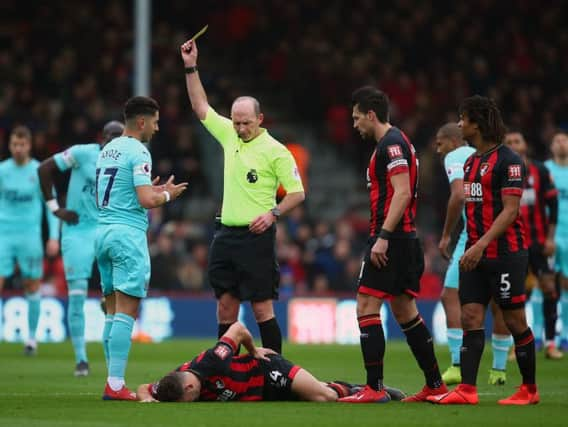The major football rule changes that will affect Newcastle United next season


The International FA Board (IAFB) have introduced a number of changes for the 2019/20 season including clarifying handball regulations and changes to goal kicks, free kicks and goal celebrations.
All of the changes will come into force on June 1, 2019 and these are the main points.
Dropped ball
Advertisement
Hide AdAdvertisement
Hide AdIf play is stopped inside the penalty area, the ball will be dropped for the goalkeeper.
If play is stopped outside the penalty area, the ball will be dropped for one player of the team that last touched the ball at the point of the last touch.
In all cases, all the other players (of both teams) must be at least 4m (4.5yds) away If the ball touches the referee (or another match official) and goes into the goal, team possession changes or a promising attack starts, a dropped ball is awarded.
Free kicks
When there is a ‘wall’ of three or more defenders, the attackers are not allowed within 1m (1 yd) of the wall; an attacker less than 1m (1yd) from the ‘wall’ when the kick is taken will be penalised with an indirect free kick.
Advertisement
Hide AdAdvertisement
Hide AdWhen the defending team takes a free kick in their own penalty area, the ball is in play once the kick is taken; it does not have to leave the penalty area before it can be played.
Goal celebrations
A yellow card for an ‘illegal’ celebration (e.g. removing the shirt) remains even if the goal is disallowed.
Goal kick
The ball is in play once the kick is taken; it can be played before leaving the penalty area.
Handball
Deliberate handball remains an offence.
The following ‘handball’ situations, even if accidental, will be a free kick:
Advertisement
Hide AdAdvertisement
Hide Ad- the ball goes into the goal after touching an attacking player’s hand/arm.
- a player gains control/possession of the ball after it has touches their hand/arm and then scores, or creates a goal-scoring opportunity.
- the ball touches a player’s hand/arm which has made their body unnaturally bigger.
- the ball touches a player’s hand/arm when it is above their shoulder (unless the player has deliberately played the ball which then touches their hand/arm).
Advertisement
Hide AdAdvertisement
Hide AdThe following will not usually be a free kick, unless they are one of the above situations:
- the ball touches a player’s hand/arm directly from their own head/body/foot or the head/body/foot of another player who is close/near.
- the ball touches a player’s hand/arm which is close to their body and has not made their body unnaturally bigger.
- if a player is falling and the ball touches their hand/arm when it is between their body and the ground to support the body (but not extended to make the body bigger).
Advertisement
Hide AdAdvertisement
Hide Ad- If the goalkeeper attempts to ‘clear’ (release into play) a throw-in or deliberate kick from a team-mate but the ‘clearance’ fails, the goalkeeper can then handle the ball.
Penalties
The team’s penalty taker can have (quick) treatment/assessment and then take the kick.
The goalkeeper must not be touching the goalposts/crossbar/nets; they must not be moving.
The goalkeeper must have at least part of one foot on/in line with the goal line when the kick is taken; cannot stand behind the line.
Substitutions
Advertisement
Hide AdAdvertisement
Hide AdA player who is being substituted must leave the field by the nearest point on the touchline/goal line (unless the referee indicates the player can leave quickly/ immediately at the halfway line or a different point because of safety, injury etc.)
Goal kick
The ball is in play once the kick is taken; it can be played before leaving the penalty area.